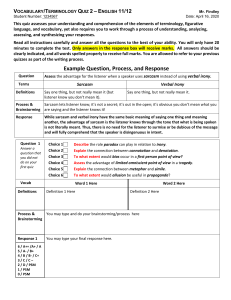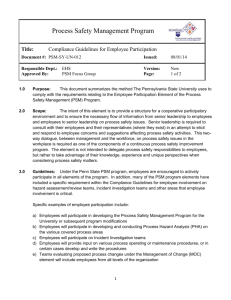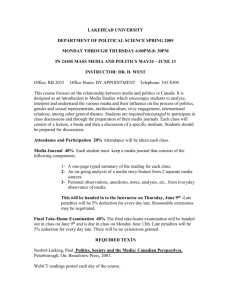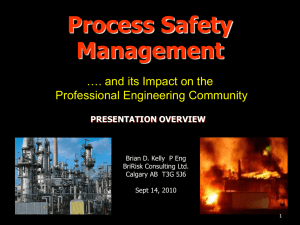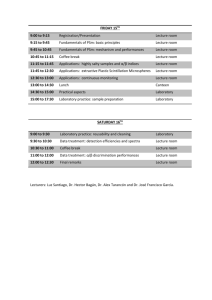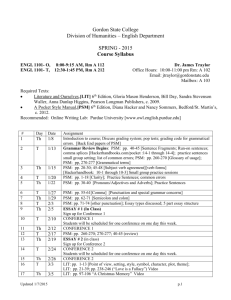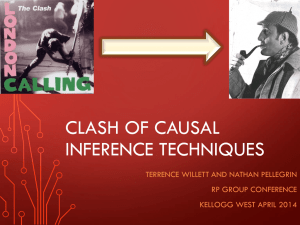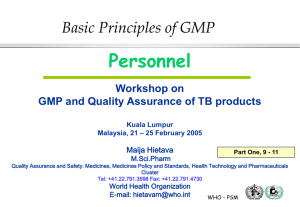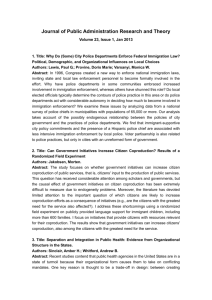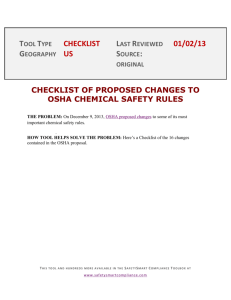Student_Number_Vocab-Quiz-1
advertisement
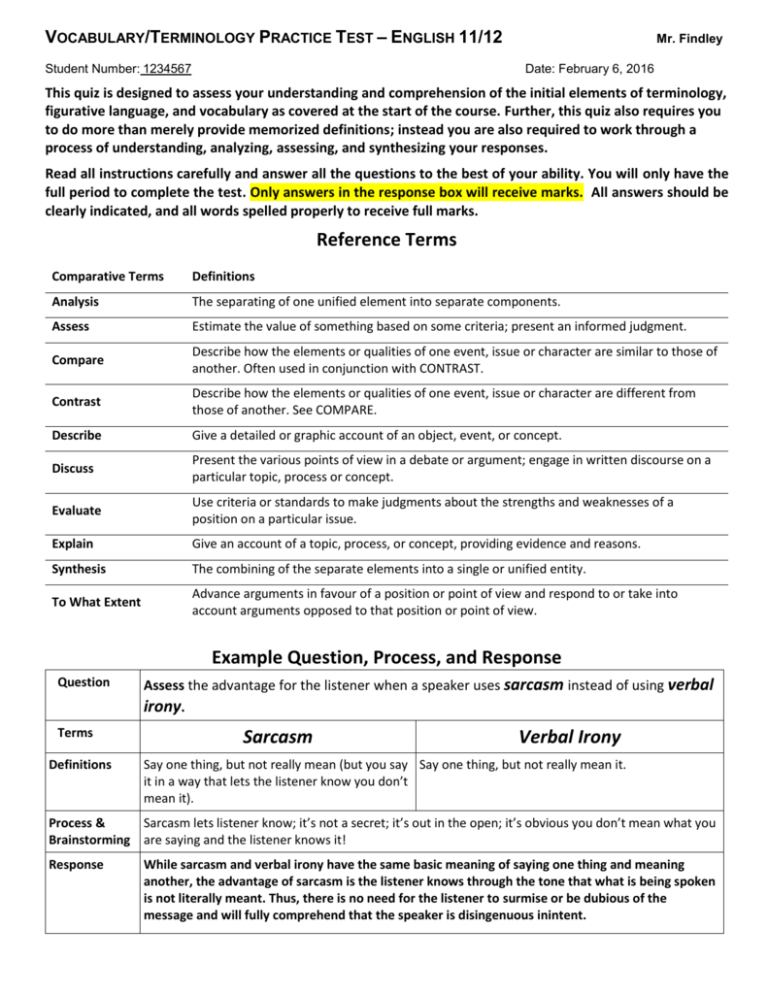
VOCABULARY/TERMINOLOGY PRACTICE TEST – ENGLISH 11/12 Student Number: 1234567 Mr. Findley Date: February 6, 2016 This quiz is designed to assess your understanding and comprehension of the initial elements of terminology, figurative language, and vocabulary as covered at the start of the course. Further, this quiz also requires you to do more than merely provide memorized definitions; instead you are also required to work through a process of understanding, analyzing, assessing, and synthesizing your responses. Read all instructions carefully and answer all the questions to the best of your ability. You will only have the full period to complete the test. Only answers in the response box will receive marks. All answers should be clearly indicated, and all words spelled properly to receive full marks. Reference Terms Comparative Terms Definitions Analysis The separating of one unified element into separate components. Assess Estimate the value of something based on some criteria; present an informed judgment. Compare Describe how the elements or qualities of one event, issue or character are similar to those of another. Often used in conjunction with CONTRAST. Contrast Describe how the elements or qualities of one event, issue or character are different from those of another. See COMPARE. Describe Give a detailed or graphic account of an object, event, or concept. Discuss Present the various points of view in a debate or argument; engage in written discourse on a particular topic, process or concept. Evaluate Use criteria or standards to make judgments about the strengths and weaknesses of a position on a particular issue. Explain Give an account of a topic, process, or concept, providing evidence and reasons. Synthesis The combining of the separate elements into a single or unified entity. To What Extent Advance arguments in favour of a position or point of view and respond to or take into account arguments opposed to that position or point of view. Example Question, Process, and Response Question Terms Definitions Assess the advantage for the listener when a speaker uses sarcasm instead of using verbal irony. Sarcasm Verbal Irony Say one thing, but not really mean (but you say Say one thing, but not really mean it. it in a way that lets the listener know you don’t mean it). Process & Sarcasm lets listener know; it’s not a secret; it’s out in the open; it’s obvious you don’t mean what you Brainstorming are saying and the listener knows it! Response While sarcasm and verbal irony have the same basic meaning of saying one thing and meaning another, the advantage of sarcasm is the listener knows through the tone that what is being spoken is not literally meant. Thus, there is no need for the listener to surmise or be dubious of the message and will fully comprehend that the speaker is disingenuous inintent. VOCABULARY/TERMINOLOGY PRACTICE TEST – ENGLISH 11/12 Question 1 Choice 1 Choice 2 Choice 3 Mr. Findley Describe the role paradox can play in relation to irony. Explain the connection between connotation and denotation. To what extent would bias occur in a first person point of view? Vocab Word 1 Here Definitions Word 2 Here Definition 1 Here Definition 2 Here Process & You may type and do your brainstorming/process here Brainstorming Response 1 You may type your final response here. 6 / A++ /A+ / A 5 / A- / B+ 4 / B / B- / C+ 3/C/C– 2 / D / PSM 1 / PSM 0 / PSM Question 2 Choice 1 Choice 2 Choice 3 Assess the advantage of limited omniscient point of view in a tragedy. Explain the connection between metaphor and simile. To what extent would allusion be useful in propaganda? Vocab Word 1 Here Definitions Word 2 Here Definition 1 Here Definition 2 Here Process & You may type and do your brainstorming/process here Brainstorming Response 2 You may type your final response here. 6 / A++ /A+ / A 5 / A- / B+ 4 / B / B- / C+ 3/C/C– 2 / D / PSM 1 / PSM 0 / PSM 2 of 3 VOCABULARY/TERMINOLOGY PRACTICE TEST – ENGLISH 11/12 Content – what is said WOW! Your response is entertaining, engaging, and focused; it shows a thorough understanding of the task. 6 / A++ /A+ / A Response answers the question in a highly engaging and appropriate manner Response is developed with interesting and enjoyable details Response demonstrates an elevated understanding of the vocabulary terms Response includes a strong ending or concluding statement Mr. Findley Written Expression – how it’s said Tightly focused on topic and fully developed Sophisticated vocabulary, word choice, and transitions Sentence structure is varied and controlled Few mechanical or spelling errors STRONG! Response presents the topic in an entertaining and well organized manner Your response effectively Response is developed with appropriate and effective accomplishes the details requirements of the task. Ending complements and affirms the main idea(s) of 5 / A- / B+ Focused, on topic, and developed Appropriate vocabulary, word choice, and transitions Sentence structure is varied and competent but GOOD Response presents the topic in a predictable yet enjoyable manner Your response Response is developed with some effective details adequately fulfills the requirements of the task. Ending provides closure to the response 4 / B / B- / C+ Generally focused; may stray off topic; adequate uneven in places Minor mechanical or spelling errors the response development Vocabulary, word choice and transitions are simple but correct Sentence structure is correct, but simple sentences predominate Some mechanical or spelling errors are present but do not affect understanding A PASS Your response accomplishes the task at a basic level. 3/C/C- Response presents the topic in a manner that is ALMOST Your response does not accomplish the basic task. 2 / D / PSM Response presents the topic in a manner which is difficult to follow Response development is weak Opening is vague or not present Loose focus; may be confusing; limited development Vocabulary is basic and repetitive; transitions may be ineffective Sentence structure is awkward or simplistic illogical or insufficient Response development is weak Opening is vague or not present Simple sentence forms predominate Numerous mechanical or spelling errors disrupt the flow of the writing Lacks focus, purpose, and development Vocabulary is informal and often colloquial; transitions are not present NOT YET Your response is incomplete 1 / PSM Composition may be limited to a limited number of sentences Opening may not be present Structure and development may not be present Composition lacks an effective ending Lacks focus, purpose, or is not present using a unified voice Vocabulary is immature or vague; word choice is not appropriate Sentence structure is incoherent Frequent grammar or spelling errors affect understanding NOT AT ALL 0 / PSM Response is too brief to evaluated or not attempted at all 3 of 3
